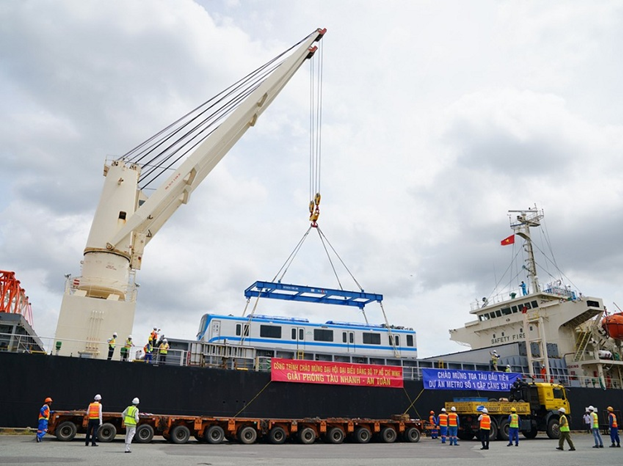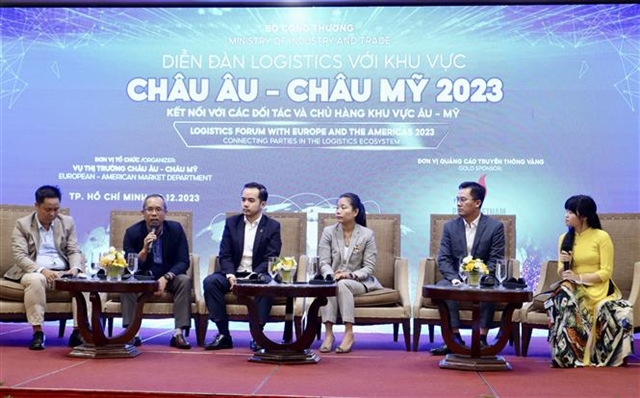 Economy
Economy

Việt Nam needs to improve its ability to connect domestic logistics networks with international ones, especially given the volatile economy and fierce competition, experts said.

|
| Speakers at the Logistics Forum for Europe - Americas 2023, organised by the Ministry of Industry and Trade on Thursday in HCM City. VNA/VNS Photo |
HCM CITY — Việt Nam needs to improve its ability to connect domestic logistics networks with international ones, especially given the volatile economy and fierce competition, experts said.
Speaking at the Logistics Forum for Europe - Americas 2023 on Thursday, Tạ Hoàng Linh, head of the Ministry of Industry and Trade’s Department of European-American Markets, said logistics plays a key role in connecting and promoting the country's socio-economic development and the economy's competitiveness.
Although Việt Nam is known as a sourcing destination and is uniquely positioned in the developing region of the world, there are nearly 35,000 companies and 5,000 professional businesses operating in the logistics sector, he said.
According to the latest World Bank report, Việt Nam ranks 43rd in the logistics efficiency index and is currently among the top five leading countries in ASEAN.
However, he added that global market changes and economic difficulties have intensified pressure on the logistics industry to optimise competition and win contracts.
Chandler So, CEO of GEODIS Vietnam, said Việt Nam is a dynamic developing country in Southeast Asia and an important business partner for Europe and the Americas.
Việt Nam has gradually received more orders for products that were previously imported from China, he said.
The main export items from Việt Nam to Europe and the Americas include electronics, machinery and electrical equipment, footwear, textiles, coffee, rice, seafood, industrial machinery, and furniture, he added.
Việt Nam’s significant advantage comes from the EU-Vietnam Free Trade Agreement (EVFTA), which removed most export duties in trade between Việt Nam and EU countries, he said.
However, he said the decreasing global consumer demand directly affects trade and logistics activities, making them increasingly challenging.
Trương Nguyên Linh, deputy general director of Vietnam International Container Terminals (VICT), said limited connection of inland road and waterway transport infrastructure with the ports has caused traffic congestion and affecting route and costs for businesses.
Meanwhile, the Mekong Delta region has a dense network of rivers and canals, but it has not been fully utilised for transporting goods to ports in HCM City to save costs.
Nguyễn Xuân Hùng, deputy general director of the Railway Transport and Trading Joint Stock Company (Ratraco), pointed out the limitations of the railway transport infrastructure in Vietnam and the need to upgrade it to international standards.
Most narrow gauge railways in Việt Nam can only achieve a maximum transport speed of 80km per hour, whereas international railways can reach 160km per hour.
As a result, the volume of goods transported by rail in domestic Việt Nam and connected to export markets is minimal compared to many other countries.
Recommendations
Tạ Hoàng Linh, head of the Ministry of Industry and Trade’s Department of European-American Markets, recommended optimising logistics costs and enhancing the competitiveness of Vietnamese enterprises and their import-export goods.
He also recommended investing in environmentally friendly strategies and technology innovation to improve competitiveness and ensure sustainable development.
Nguyễn Xuân Hùng, deputy general director of the Railway Transport and Trading Joint Stock Company (Ratraco), said Việt Nam needs to upgrade its railway system to international standards to enhance its ability to connect goods by rail in domestic areas as well as other export markets.
Professor Daniel Wong, from Portland State University in the US, proposed logistics businesses pay attention to risk management from cybersecurity and how to innovate technology and connect globally while maintaining data security.
Chandler So, CEO of GEODIS Vietnam, recommended considering cultural nuances, market preferences, and local regulations to meet customer expectations, which is especially important for markets prioritising sustainability and ESG (Environmental, Social, and Corporate Governance) factors like Europe and the Americas.
The forum was organised by the Ministry of Industry and Trade. — VNS




